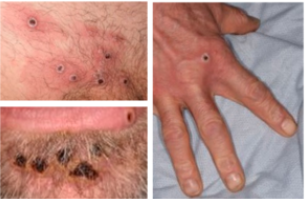Mpox is an uncommon infection caused by the mpox virus.
It is most often found in parts of central and east Africa. Since 2022, a small number of people in Ireland have been diagnosed with mpox.
There are 2 types of mpox:
- clade I
- clade II
Clade I mpox may be the more serious type. It is spreading within parts of Africa. It is rarely seen outside of Africa.
Most cases of mpox in Ireland have been clade II.
The risk of catching mpox in Ireland is low.
How you get mpox
Mpox spreads from person to person through very close contact.
This can be through:
- sexual contact or other intimate contact (such as kissing or cuddling)
- touching clothing, bedding or towels used by someone with the mpox rash or scabs
- touching mpox blisters or scabs
- coughs or sneezes of a person with mpox when they're very close to you
Mpox may also spread from animals to people in areas where infected animals are found.
Anyone can get mpox. But you are more likely to get it if you are in close contact or live with someone who has mpox.
For example, you may be more at risk if you are the person’s partner or healthcare worker.
If you are identified as a close contact of someone who has mpox, you'll be contacted by healthcare professionals.
Symptoms of mpox
It usually takes between 5 and 21 days for the first symptoms of mpox to appear.
The first symptoms may include:
- a high temperature (38.5 degrees Celsius or higher)
- headaches
- muscle aches or joint pains
- back ache
- swollen glands
- shivering (chills)
- exhaustion
A rash usually appears 1 to 5 days after the first symptoms.
It can appear on any part of your body including your:
- mouth
- palms of your hands
- soles of your feet
- genitals or bottom (anus)
You may also have pain or bleeding from your bottom (anus).
The rash starts as raised spots, which turn into sores (ulcers) or small blisters filled with fluid. The blisters eventually form scabs which later fall off.
The rash and other symptoms usually clear up in 2 to 4 weeks.
Occasionally people with a very weak immune system, pregnant women or very young babies can have a more severe illness.
Urgent advice: Contact a STI clinic or GP if you have either:
- a rash that looks like mpox
- been identified as a close contact of someone who has mpox
If your local STI clinic and GP are closed, contact a GP out-of-hours service or emergency department (ED).
Important
Phone first before going to a GP surgery, clinic or any other healthcare setting. They can tell you what to do to avoid spreading any potential infection. Stay at home while you are waiting to be assessed. Avoid close contact with other people.
What to do if you have mpox
If you have mpox, your healthcare professional will tell you how to manage your symptoms. They will also tell you where you will be cared for.
Most cases of clade II mpox can be managed at home.
If you are getting care at home, you will need to self-isolate. This is because the infection can be passed on through close contact. You may need to self-isolate for 2 to 4 weeks. Your healthcare professional will tell you when it’s safe to stop self-isolating.
Treatment for mpox
Mpox treatment involves relieving the symptoms. There is no cure for mpox.
Mpox is usually mild. Most people get better without treatment. But if you have more severe symptoms or become unwell, you might need treatment in hospital.
Most people recover in 2 to 4 weeks.
Mpox vaccine
Vaccination is recommended for people who may be at increased risk of mpox infection. For example, gay, bisexual or other men who have sex with men, sex workers and some healthcare workers.
You can book an appointment to get the mpox vaccine at:
St Vincent’s Hospital in Dublin 4
Phone: 01 221 5525
Email: mpoxvaccines@svhg.ie
Mater Hospital in Dublin 7
Email: mpxvax@mater.ie
If you already attend a public sexual health clinic ask if you can get the vaccine there.
Reduce your risk of getting mpox
There are things you can do to reduce your risk of getting mpox.
Do
-
stay informed with the latest travel advice if you are travelling abroad
-
wash your hands with soap and water regularly or use an alcohol-based hand sanitiser and encourage others to do the same
-
have open conversations with sexual partners about their health and any symptoms they may have
-
if you have mpox symptoms, take a break from sex or intimate contact until you get advice from your GP or STI clinic
-
get vaccinated if you are at higher risk
Don't
-
do not share bedding or towels with people who are unwell and may have mpox
-
do not have close contact with people who are unwell and may have mpox
-
do not go near wild or stray animals, including animals that appear unwell or are dead, while travelling in central or east Africa
-
do not touch or eat meat from wild animals while travelling in central or east Africa
Content supplied by the NHS and adapted for Ireland by the HSE
